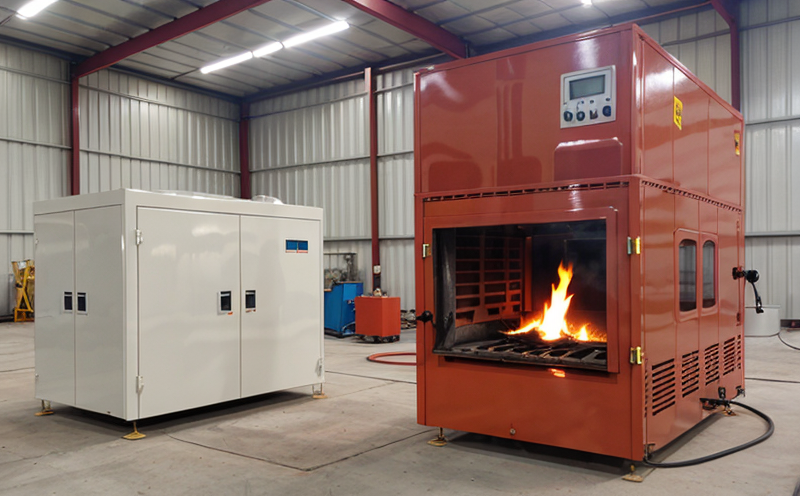ASTM E2550 Thermomechanical Analysis (TMA) of Materials
The ASTM E2550 standard specifies a method for measuring the linear thermal expansion and softening behavior of materials under load. This technique is particularly valuable in metallurgy and material testing as it provides insights into how materials deform under stress at various temperatures, which is critical for understanding their suitability in different applications.
In the context of heat treatment and thermal properties testing, TMA helps evaluate the effectiveness of heat treatments by assessing changes in dimensional stability. This analysis can identify potential issues with microstructure evolution during processing, ensuring that materials meet quality standards and perform reliably under operational conditions.
The ASTM E2550 procedure involves subjecting a specimen to controlled heating or cooling while measuring its expansion or contraction along one axis. The load applied to the specimen allows for the observation of softening points, which are essential for determining thermal stability and phase transformation temperatures. This data is crucial for industries relying on high-precision materials, such as aerospace, automotive, and electronics.
The instrumentation used in ASTM E2550 testing includes a TMA machine that applies precise heating or cooling rates while monitoring specimen displacement with high accuracy. The results are typically presented graphically, showing the relationship between temperature and expansion/contraction under load.
Preparing specimens for TMA requires careful selection to ensure accurate representation of the material's properties. Typically, small samples cut from larger pieces are used to minimize edge effects. Proper preparation includes ensuring uniformity in dimensions and surface finish to avoid introducing errors during measurement.
The primary benefit of ASTM E2550 testing lies in its ability to provide detailed insights into the thermal behavior of materials. This information is vital for optimizing heat treatment processes, predicting material performance under various temperature conditions, and ensuring compliance with industry standards. By identifying critical points such as softening temperatures, TMA aids in selecting appropriate materials for demanding applications.
- International Acceptance and Recognition:
- The ASTM E2550 standard is widely accepted across various sectors, including aerospace, automotive, electronics, and manufacturing. Its global recognition ensures that the results of TMA testing are universally applicable and comparable.
- This acceptance extends to regulatory bodies such as the European Union (EU) and the International Organization for Standardization (ISO), further validating its importance in material characterization.
Benefits
The benefits of ASTM E2550 Thermomechanical Analysis extend beyond mere compliance with industry standards. It offers a comprehensive understanding of materials' thermal and mechanical properties, which is indispensable for quality assurance in manufacturing processes.
By providing precise data on linear thermal expansion and softening behavior, this technique enhances the reliability and performance of materials used in critical applications. This information helps manufacturers make informed decisions about process parameters, ensuring that products meet stringent quality requirements.
The ability to predict material failure points and optimize heat treatment processes is a significant advantage in industries where material integrity is paramount. For instance, aerospace components must withstand extreme temperature variations without compromising safety or performance. ASTM E2550 testing ensures that materials used in these applications are robust enough to endure such conditions.
Moreover, the detailed insights provided by TMA testing facilitate innovation and development of new materials. Engineers can leverage this data to develop alloys with improved thermal stability and mechanical properties, leading to advancements in product design and functionality.
Customer Impact and Satisfaction
The implementation of ASTM E2550 Thermomechanical Analysis significantly enhances customer satisfaction by ensuring high-quality materials that meet stringent performance standards. This approach not only addresses regulatory compliance but also exceeds expectations in terms of reliability and durability.
By integrating TMA testing into their quality control processes, companies can confidently offer products that are less likely to fail under operational conditions. This reduces the risk of product recalls and associated costs, thereby protecting brand reputation and customer trust.
The detailed data provided by ASTM E2550 testing also enables manufacturers to tailor heat treatment processes precisely, leading to optimized production cycles. This efficiency translates into cost savings and faster time-to-market for new products, ultimately benefiting both customers and the company.
Furthermore, the use of this standardized method ensures that all stakeholders involved in material selection and processing are on the same page regarding quality expectations. This alignment fosters better communication and collaboration across teams, enhancing overall operational efficiency.





